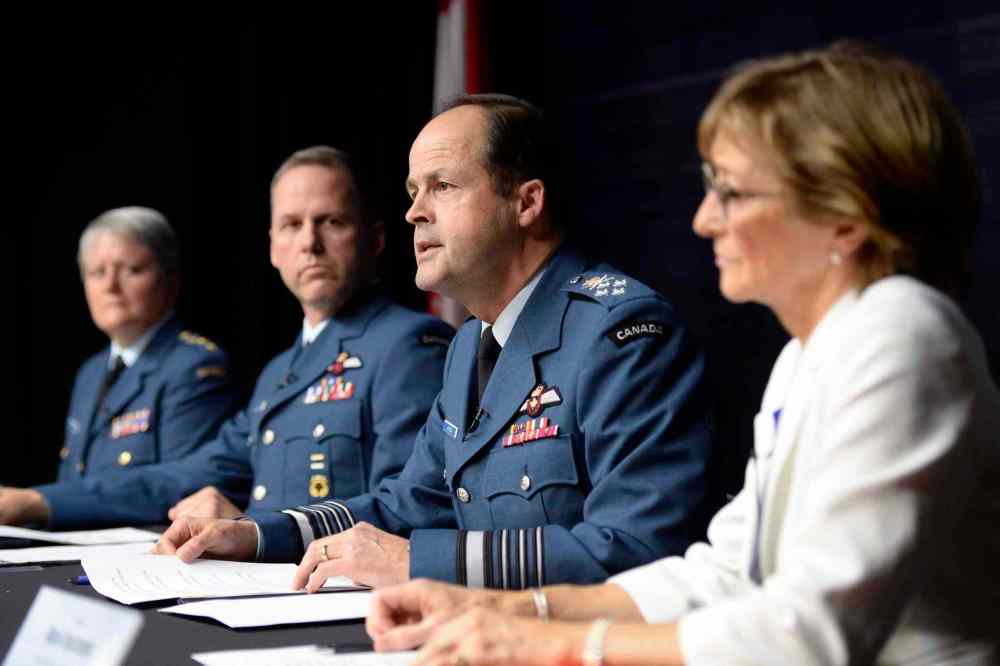Macho culture saps military reputation
Advertisement
Read this article for free:
or
Already have an account? Log in here »
To continue reading, please subscribe:
Monthly Digital Subscription
$0 for the first 4 weeks*
- Enjoy unlimited reading on winnipegfreepress.com
- Read the E-Edition, our digital replica newspaper
- Access News Break, our award-winning app
- Play interactive puzzles
*No charge for 4 weeks then price increases to the regular rate of $19.95 plus GST every four weeks. Offer available to new and qualified returning subscribers only. Cancel any time.
Monthly Digital Subscription
$4.99/week*
- Enjoy unlimited reading on winnipegfreepress.com
- Read the E-Edition, our digital replica newspaper
- Access News Break, our award-winning app
- Play interactive puzzles
*Billed as $19.95 plus GST every four weeks. Cancel any time.
To continue reading, please subscribe:
Add Free Press access to your Brandon Sun subscription for only an additional
$1 for the first 4 weeks*
*Your next subscription payment will increase by $1.00 and you will be charged $16.99 plus GST for four weeks. After four weeks, your payment will increase to $23.99 plus GST every four weeks.
Read unlimited articles for free today:
or
Already have an account? Log in here »
Hey there, time traveller!
This article was published 01/05/2015 (3904 days ago), so information in it may no longer be current.
People in the military salute and obey orders. Yes, Sir. No, Sir. Right away, Sir (or Ma’am).
Failure to comply can cause a range of punishments, including fines, demotion, hard duty, incarceration and even the old heave-ho.
There’s one order, however, that isn’t getting through — the one against sexual harassment and abuse.

The Canadian Armed Forces appears to be a cesspool of primitive macho culture, where women and members of the LGBTQ community are subjected to a wide range of abuse, demeaning comments and sexual assault.
Former Supreme Court justice Marie Deschamps said in a report Thursday the problem is “endemic” and “commonplace.”
Her study found there is “a prevailing sexualized environment characterized by the frequent use of sexualized language, sexual jokes, innuendos, discriminatory comments with respect to the abilities of female members of the military, and less serious but unwelcome sexual touching, such as touching an individual’s shoulder or back without her consent.”
This crude and pervasive behaviour, Ms. Deschamps said, “creates a climate conducive to more serious incidents of sexual misconduct.”
Unfortunately, there was nothing particularly startling in her report. Sexual abuse and harassment have been a problem in the military from the time women were allowed to join. As more roles opened up for women as pilots, officers, field commanders and ordinary sailors and soldiers, the problem just got worse.
Ms. Deschamps said in her report conditions have not improved since the last internal examination of the problem 20 years ago. And that study was preceded by “no less than five studies bearing on harassment.”
Predictably, the retired judge discovered many women are reluctant to come forward with complaints because they fear repercussions. They also do not trust the military investigative process to keep their stories confidential.
Ms. Deschamps recommended an independent process to investigate allegations of sexual misconduct so more victims will come forward and to ensure impartial investigations, particularly when some of the alleged perpetrators may be officers.
Gen. Tom Lawson, the outgoing chief of the defence staff, however, has refused to commit to implementing her recommendation. He didn’t rule it out, but said the existing military justice system already functions independently. This falls in line with police forces that have also resisted the idea of external investigations on the grounds they are capable of dealing with their own bad actors.
Women have made tremendous progress in military careers since the Armed Forces lifted the ceiling of 1,500 female positions in 1971. And gays and lesbians have served openly in the military since 1992.
Women now serve in all roles, including combat and in submarines, but they are still less than 15 per cent of the total complement. As such, they are a distinct minority in a male-dominated culture, which itself has not matured with the times.
The RCMP drafted a code of conduct against sexual harassment last year following a wave of complaints from female members, which seems a little farcical.
Why rely on a written code that is not only self-evident, but also enshrined in workplace and human rights laws and, in the case of serious offences, the Criminal Code?
The military and similar machismo-oriented organizations that condone sexism have shown they cannot be trusted to manage the problem. And until they learn to take orders and behave properly, external agencies will be needed to ensure complaints are handled properly.

